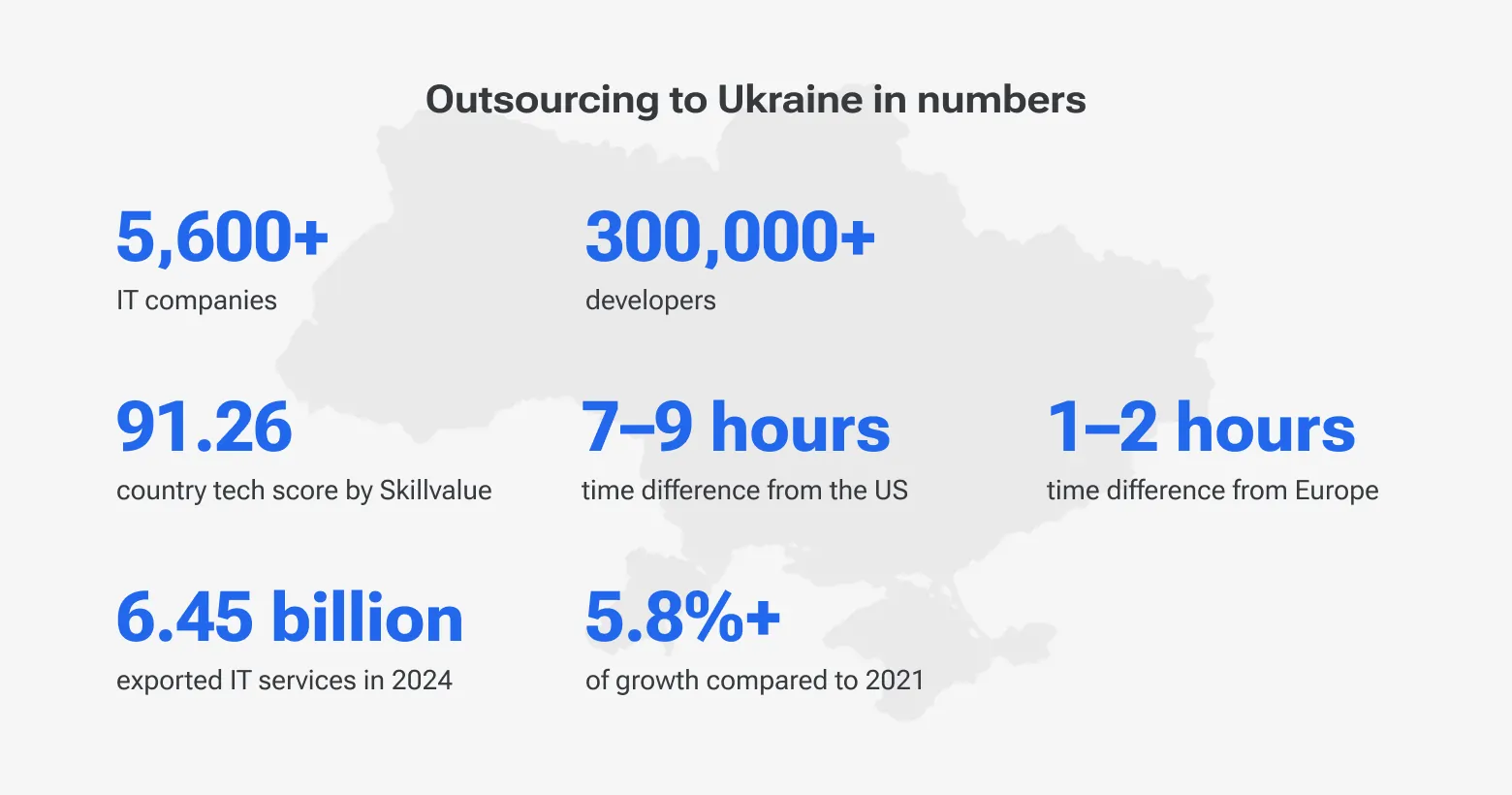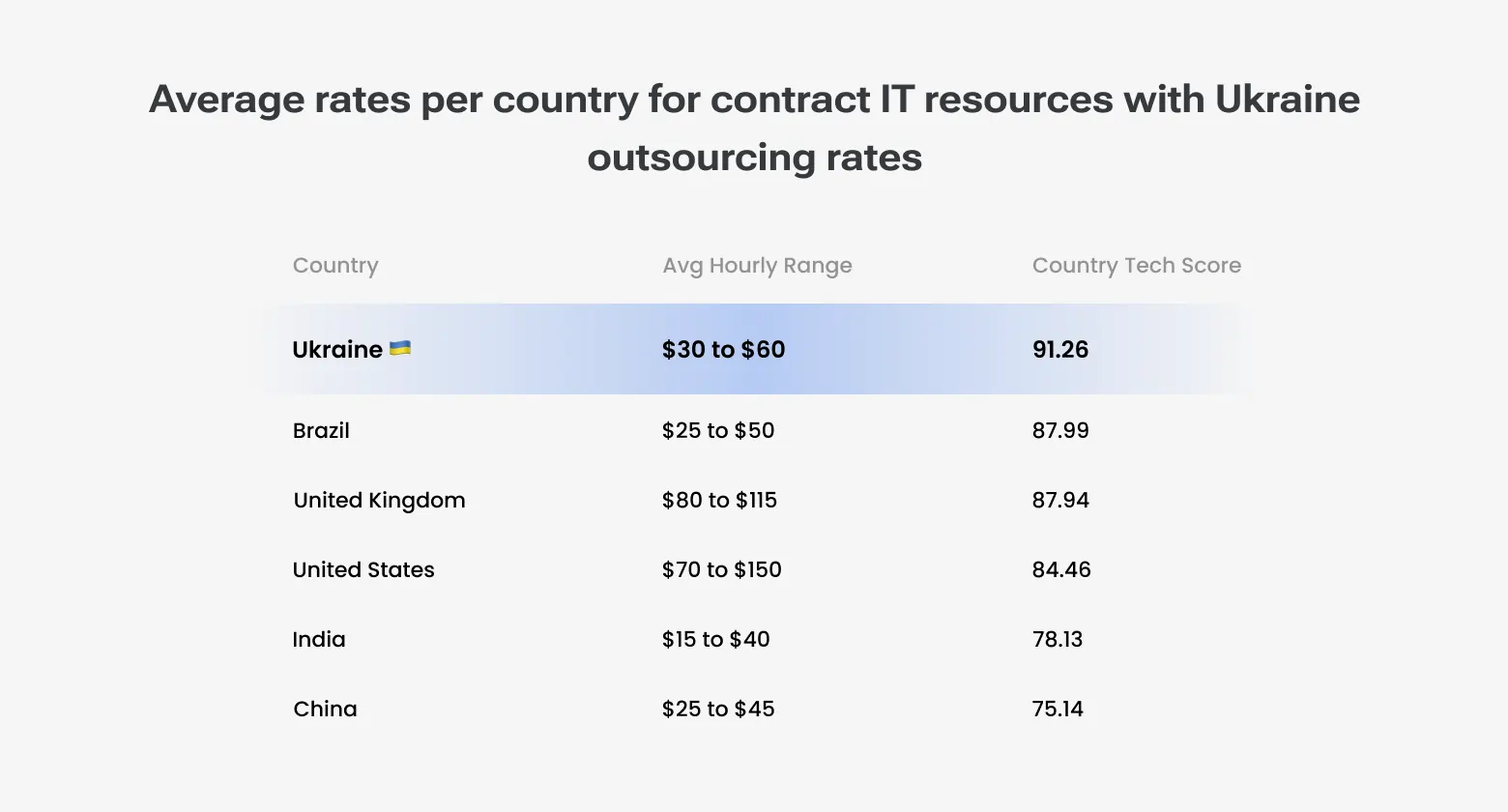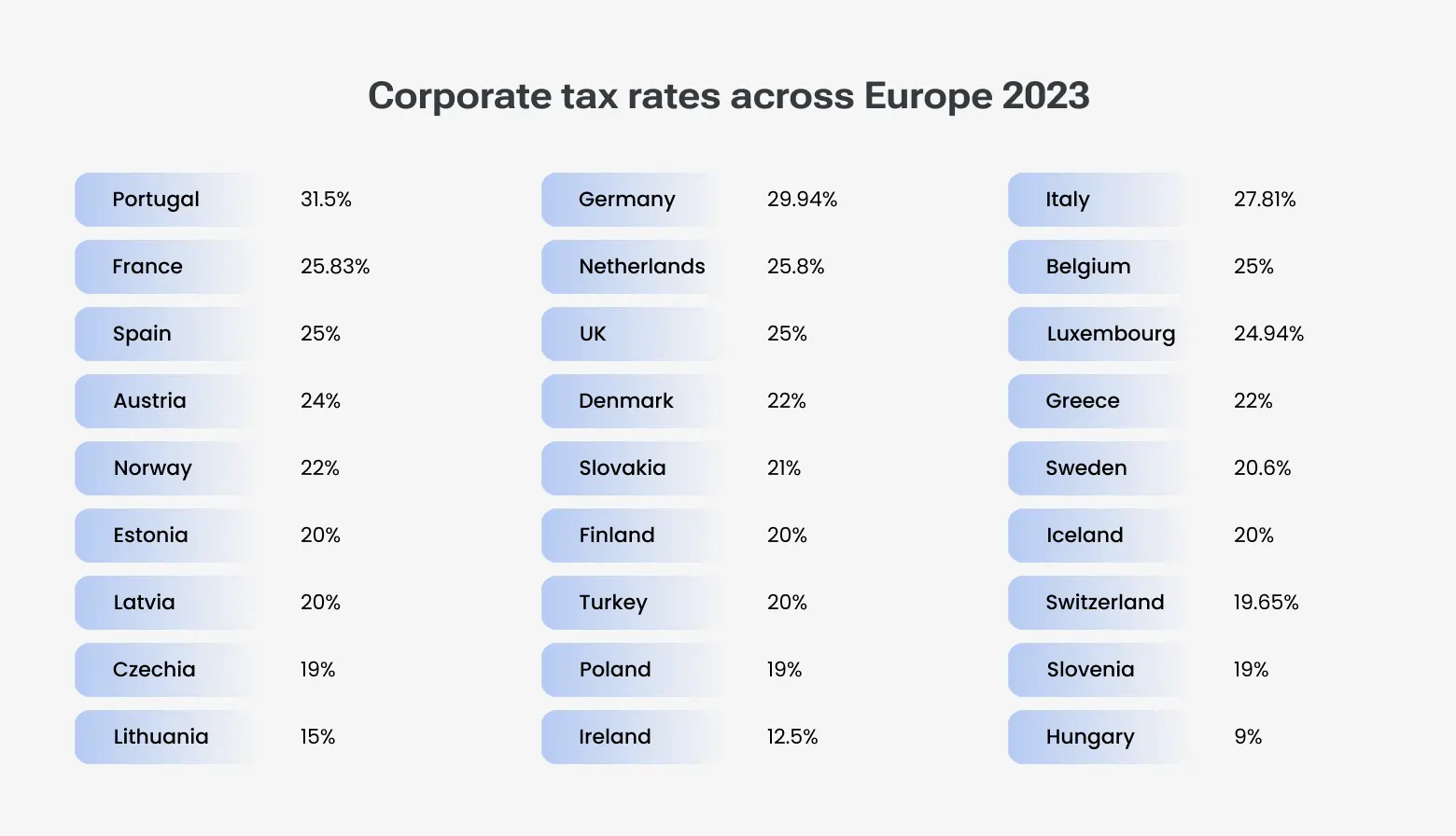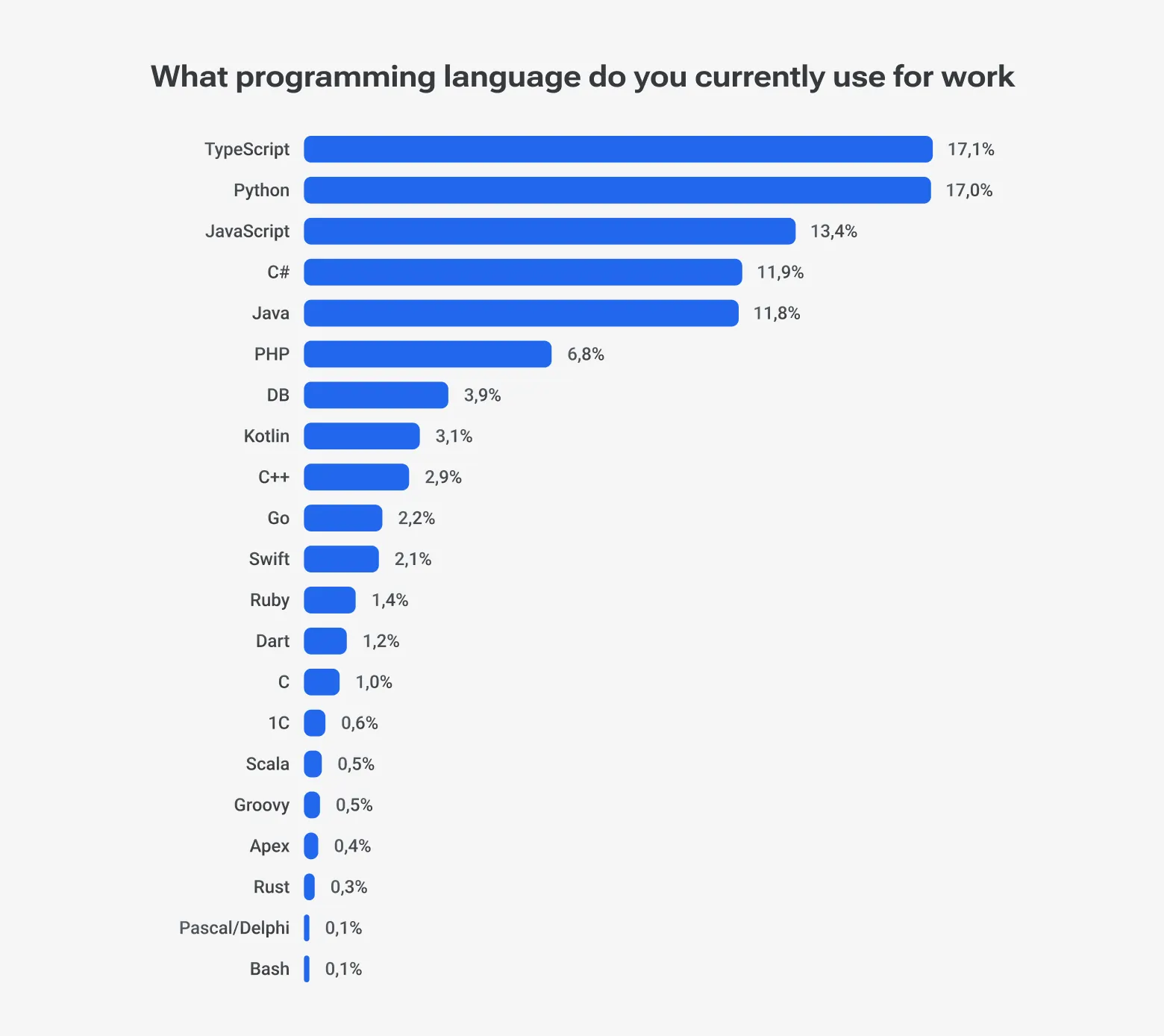Over 300,000 IT professionals contribute nearly 38% to the national exports and generate USD 6.4 billion in exports. Tech Ukraine forecasts Ukraine’s tech industry will generate USD 10 billion in 2025. And this is considering a 4% decline due to war hurdles. The sector was taught to stay resilient and adaptable. That’s why you should consider IT outsourcing to Ukraine.
The Russian invasion has undeniably impacted various facets of Ukrainian society, yet the IT industry has managed to not only sustain but also expand its global footprint.
Flexible yet robust contingency plans, measures to ensure uninterrupted service delivery — this commitment proves that offshore software development company in Ukraine will go the extra mile to deliver.
Flexible staff augmentation and expert software developers in Ukraine
A deep-rooted culture of technical education is why Ukraine’s IT outsourcing continues to be a strategic advantage for foreign businesses in 2025.
Let’s explore why choosing software development outsourcing in Ukraine is more about clear benefits than you even could think of.
Risks: The state of Ukraine’s IT outsourcing market
About 3-5 years before the full-scale war, Ukraine became a top-dog IT outsourcing destination. But then, the country “encountered” unmatched challenges: a furious invasion, energy terror, and massive hacking attempts. However, throughout these years, Ukraine proved its resilience and a wise business-first approach.
That’s why you shouldn’t be amazed by their current state.
Market size and projections: Last year, Ukraine’s IT export industry generated about USD 6.4 billion. Although there are no reputable projections, many sources state it’d achieve USD 10 billion in the next 3 years despite the war. Also, it’s worth mentioning that the main importer of UA services is still the United States (USD 2.4 billion), followed by the United Kingdom and Malta.
Number of companies: There are from 2,500 to 5,600 active offshore software development companies in Ukraine, about 550+ specializing in IT services. Unexpected invasion and problems that the war has posed, forced Ukrainian people to innovate, make up new things, and rethink the usage of old things, like generators and old electronics.
Export volume: As we said above, Information and Communication Technology grabbed 38% of all service exports in 2024. About 20% of Fortune 500 companies have dedicated development teams here. This adds up to about 100 R&D centers of global tech giants like Microsoft.
Talent pool: Tech Ukrainian pros are known for their commitment, tech proficiency, and now, resilience. Different sources show a range of 285,000 to 363,000 tech specialists. Over 20,000 IT graduates annually spring from UA universities. The most famous ones are the National Technical University of Ukraine (KPI), Ukrainian Catholic University, Taras Shevchenko National University of Kyiv, and Lviv Polytechnic National University.
Key industries served: FinTech, eCommerce, cybersecurity, healthcare, and agritech. In recent years, Ukrainians are gaining ground as specialists in AI and blockchain. Also, recent years marked Ukraine’s specialization in digital governmental services: it ranks 30th in the world (out of 193 countries).
Cost vs. value: What level and quality to expect when outsourcing to Ukraine
Ukraine is known for lower costs and robust software quality. Balance-seekers will be pleased.
How to outsource software development to Ukraine. A complete guide
Developer rates: Europe vs. Ukraine
Middle software engineer makes about USD 2450 per month. In terms of hours, it’s about USD 30 - USD 60 per hour. Compare: Polish developers usually charge USD 40 - USD 90 per hour. Considering the number of average post-release fixes, Ukraine is a really cost-effective option.
Cost vs. quality: Is it worth your money?
Despite the lower costs, Ukrainian developers deliver. Maybe, it’s the internal culture, maybe the understanding of the real value of money — anyway, the output of Ukrainian devs usually proves it’s worth the deal.
STEM education and a continuous learning approach contribute to a truly skilled workforce that can deliver complex and effective solutions.
Hidden costs and operational savings
Outsourcing in general is a perfect way to save money. Speaking specifically about Ukraine, software outsourcing is the way to get the most out of your money. Overpromise? Compare Ukraine’s tax policies (the corporate tax is 18%) with the ones across Europe.
Add remote work adoption and calculate cost savings. Many Ukrainian companies offer comprehensive services that include project management and quality assurance, so you don’t need to spend more.
Are Ukrainian developers that skilled?
In a nutshell, yes. Let’s hash this out.
(Un)popular languages, frameworks, and approaches
Leading UA dev community DOU states that, in 2025, it's easier to hire TypeScript developers since this programming language has beaten JavaScript in popularity — modern development practices as they are. Python catches up (17%) — yes, looking ahead, the Ukrainians are also on the same page with Data Science and AI engineers.
The shares of C# and Java declined, aligning with global trends favoring more versatile and efficient languages. The local IT schools have adapted their curricula to stress these in-demand languages.
Modern directions: AI, ML, cybersecurity
War is a horrible thing, but it definitely brings about innovation and adaptability. As in Ukraine’s case. Suffering from Russia’s numerical advantage, the AFU was forced to adapt through unconventional approaches and technology. They developed an AI solution to recognize wounded soldiers and war criminals, to parse information about Russian activities in Ukraine, for intelligence and counterintelligence.
We can’t help mentioning their govtech services like Diia and Army+ apps. In addition, Ukrzaliznytsia, Kyivstar, Monobank, DTEK — many Ukrainian businesses successfully repel cyberattacks every day.
Local universities produce tech talent
The Soviet educational system was the foundation of Ukraine’s educational system. However, recent years have marked a significant shift toward modern approaches and a rethinking of how students learn new things (for example, the country-wide app for schools, Mriia).
The main tech educational hubs are:
Taras Shevchenko National University of Kyiv
National Technical University of Ukraine (Kyiv Polytechnic Institute)
Ukrainian Catholic University in Lviv
Complementing formal education, specialized tech academies like EPAM University, Projector, Mate Academy, GoIT, and IAMPM train students and tech rookies to align with industry demands.
What about English proficiency and the mindset?
As of 2024, Ukraine ranks 40th out of 116 countries in the EF English Proficiency Index. Yet, in top tech companies, the average English level is B2. The cultural affinity between Ukrainian pros and Western businesses creates a collaborative environment conducive to innovation and two-way-street understanding.
Notable products developed by Ukrainian developers
Ukraine’s IT outsourcing is well-known. But how about products or services?
Do you know Grammarly, Respeecher, Reface, Ajax Systems? Well, they were created and co-created by Ukrainians. An AI-powered writing assistant has revolutionized digital communication; Reface made an advanced face-swapping technology.
Respeecher conquered Holywood, and Ajax Systems has set new standards in security solutions with its IoT devices.
Business environment and outsourcing-friendly ecosystem
IT infrastructure and tech hubs: Kyiv, Lviv, Kharkiv, and Dnipro have evolved into widely-known tech hubs. These cities have many different startups, established IT companies, and research institutions. In recent years, Vinnytsia and Ivano-Frankivsk have shown a good dynamic.
For example, international behemoths like Deloitte, Grammarly, and Samsung have their R&Ds in Kyiv. Other major cities have modern infrastructure, energy-independent co-working spaces, and innovation centers (for example, Promprylad in Ivano-Frankivsk or the Unit City in Kyiv).
Government support for the IT sector: The Ukrainian government understands that technology is the inevitable future. To avoid falling behind, they have implemented several initiatives to bolster the IT industry. The Diia.City legal space delivers favorable tax conditions and legal frameworks for tech companies. At the same time, the Ukraine Startup Fund has provided grants to over 200 startups, totaling USD 10 million in support, thereby fueling entrepreneurial ventures and innovation.
Outsource to Ukraine: is it still a safe choice?
Of course, there is an ongoing war in Ukraine. However, it may bring some unexpected benefits to foreign clients. Sounds crazy, right? Not quite. Resilience. Adaptability. Innovation. Commitment. Reputation. Delivery. Six words that say much less than the real deeds of Ukraine’s service companies.
Industry resilience
After the first successes of the Armed Forces of Ukraine, fear turned into determination. Local companies developed business continuity plans, relocated their teams, and ensured uninterrupted work.
Firms preemptively moved staff to western Ukraine or abroad, maintaining over 60% operational capacity even during intense conflict periods.
Throughout 2022-2024, Russia caused energy outages, so firms invested in alternative power solutions, (e.g., mini power stations). All the mentioned taught Ukrainians to stay flexible and result-oriented.
Remote-first mindset
The pandemic forced people to work from home, and Ukrainian developers effectively embraced it. The mentioned war also added to it, because it’s much more convenient and cost-effective to allow staff to work remotely.
That’s why Ukrainian companies that provide staff augmentation services collaborate with international clients so smoothly.
India vs. Ukraine: A comparison of top IT outsourcing destinations
Legal and security compliance
Here, you can hear an interesting proverb: “If you want to live, you should keep spinning” (which actually means “Sink or swim”).
For this reason, Ukrainian IT companies had to adhere to international legal and security standards even without becoming an EU member — General Data Protection Regulation (GDPR). Local companies also often pursue ISO certifications, reflecting their commitment to information security and quality management.
Future outlook: why Ukraine will continue to lead IT outsourcing
Ukraine’s IT sector will keep gaining ground, despite the war. Of course, there are a lot of uncertain variables, but, let’s face it: real growth happens in tough times.
Growth trends in outsourcing demand
The global demand for IT outsourcing continues to rise, and Ukraine is solidifying its position as a preferred destination. The other day, UA’s Ministry of Digital Transformation announced the development of a national LLM.
If the country keeps up with modern technologies like AI and blockchain, they will attract businesses seeking advanced yet cost-effective solutions.
Government initiatives supporting the tech industry
As we already mentioned, the Diia.City space creates a special tax regime and legal framework tailored for tech companies, promoting innovation and attracting foreign investment.
The initiative was launched weeks before the full-scale invasion, and as of 2024, it has about 1,000 Ukrainian and international companies as different kinds of members.
Predictions for the next 5 years
Industry experts anticipate that Ukraine’s IT market will resume its upward trajectory. The European Bank for Reconstruction and Development (EBRD) states that if hostilities end, Ukraine’s economy could grow by 5% in 2026.
As noted by Mykhailo Fedorov, Ukraine’s Minister of Digital Transformation, “We are committed to making Ukraine a global tech powerhouse.”
Conclusion
You’ve explored the facts, figures, and forecasts about software outsourcing in Ukraine — and you’re at a crossroads.
You could keep browsing. Another article, another guide, another thread on whether outsourcing software development in Ukraine is the right move.
But there is a wise move — take a free consultation with local tech fellows. The ball is in your court, but remember: when it comes to offshore development in Ukraine, Devico is always within reach.
One. Click. Away.
Tap into Ukrainian tech expertise with a time-to-market advantage and up to 50% budget savings







